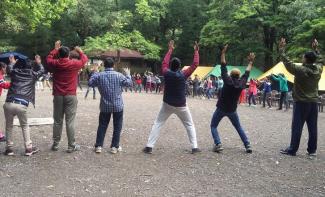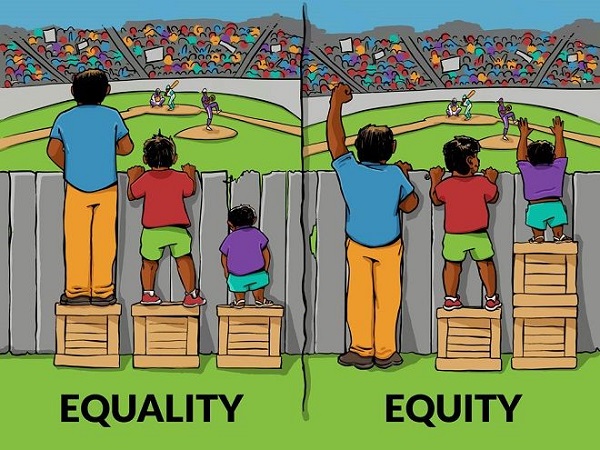
Shaloo Sharma, the head of a school in Gurgaon committed to inclusive education and Sunil Bhatt, a certified physical instructor for children with special needs from Ancramdale, New York share their views on the importance of Adaptive Physical Education for children with disabilities.
Adaptive Physical Education - A rights-based approach to accessible play.
Every child has the right to play. According to the Right To Education, it is mandatory for every school to have a robust Physial Education(PE) programme, complete with a curriculum that ensures that play is available to each student according to her capabilities and needs, just like academics. Right to play notwithstanding, it is important to make sure that play facilities are available and accessible to each type of learner. This availability of play is especially significant when we are dealing with persons with Special Needs. Most of the ‘problems‘ associated with special needs, like the person who can’t maintain himself, who does not have ‘growth’ as per norms, etc. can be managed to a great extent by play.
The focus in all schools, as well as homes, is primarily on academics. The sensory as well as social aspect of play is totally bypassed. This leads to deficits not only in self growth, but also to obesity and other health problems as well. Research shows that the number one cause of morbidity is lack of movement, a situation that play will ensure that we do not get into.
The Current Scenario in Schools
- In schools, Physical Education continues to be a competitive subject. The fact that Physical Education helps to develop an overall personality of child/ young person is largely overlooked.
- The concept of differentiated learning and teaching has yet to be developed in most schools. Here is where the relevance of Adapted Physical Education (APE) comes in to account. We have the syllabus of Physical Education in India, but we do not have curriculum / syllabus & expertise/ experience of APE.
- When we talk about APE, most stakeholders think about wheelchair sports and /or para sports, which are geared towards physical disability. On the other hand, in schools, most enrolled students have cognitive disability, like Autism, Cerebral Palsy, Downs Syndrome or Intellectual Disability. For this category of learners, we are using the same syllabus as we use with the main stream/neurotypical students. Here is where the main gap and divide arises between what is needed and what is available.
- Most schools are already sensitised to the concept of EQUALITY. The need of the hour here, however, is EQUITY .Each and every student, regardless of her ability, should be provided with an opportunity (not necessarily equal) to be able to function to the maximum of her potential.

The Approach to competition- Coaching v/s Education
We all agree that competition is healthy, regardless of one’s special needs. We all need to be able to participate in events that bring to fore our individual potential to the maximum. At the competitive level, increased awareness of APE will lead to a shift in the approach to delivering PE; from a Coaching- Based Approach to an Educational –Based Approach. APE awareness will also lead to an enhancement in the overall culture of PE. Currently, many potential players/ sport persons of the future go unnoticed, as they are not able to explore their own potential in the field of sports as play, and subsequently sport, is not made accessible to them from an early age. At most levels the players themselves are not aware, or have got no exposure to their own capabilities. Even if they have the potential, they can not actualise it as they are not getting any opportunity to compete to their level of competency. Talent loss is huge.
The Current Scenario in the Universities that Offer professional Courses in PE
Adaptive Physical Education awareness in minimal in India .In the Indian universities that offer professional course in Physical education, there is no curriculum to teach APE. The gap is in the absence of any content related to the field of Intellectual Disability, ASD, Hidden Disabilities, Development Delay and some specific conditions like SPD, GMS deficiencies etc., in the existing curriculum of PE. There are very few, if any, recourse persons related to Adapted Play and subsequently Adapted PE. There is no benchmark for APE practices. This leads to an absence of collaboration between practitioners from the area of PE and other Therapeutic and Cognitive areas. After working in the field for 10 years, we found that APE programme is very useful to achieve Daily Living and Independent Living Skills targets as well. APE will help complete the holistic circle of learning as well.
The FIVE KEY STAGES approach to delivering APE in Schools – a workable model
After day to day experience and research in the field of Special Needs and PE, and having worked in several schools, we have designed and implemented a system that has been tried and tested successfully in Inclusive schools across NCR (National Capital Region). The approach allows for the PE curriculum and plan to be delivered in five key stages,
Key Stage 1 - We work on the behaviour of the student, and get him ready to respond and function in a group.
Key Stage 2 – We focus on the student learning to accept PE as a part of recreation and the fun factor serves as a motivator for him to participate willingly in the PE plan.
Key Stage 3 – We focus on the individual potential of the child and his skills for a particular game (or generic skills involved in PE) are worked upon.
Key Stage 4 – We are geared for inclusive classes where the student not only gets to use the skills that she has learnt in stage 3, but is able to practice her social skills as well.
Key Stage 5 – We are purely focused on competition.
The way forward
- The immediate need of the hour is to ensure that the existing Universities that offer professional courses in PE make sure that basic knowledge of disability across all genres is included in their syllabus. They should also ensure that APE should be a compulsory subject in their existing curricula.
- There should be collaboration between Indian Universities and those overseas, as International Universities are doing focused and exemplary work in the field of APE. Experts from the fast developing field of APE need to share their knowledge with the Indian counterparts to ensure that we are abreast with the latest developments in the field.
- PE staff across schools should be given an orientation and professional development opportunities in the field of APE. Schools should host separate PE events for students with special needs and main stream students, and then later try and merge the two, leaning towards fun and recreation
Shaloo Sharma, the Head of a school in Gurgaon committed to inclusive education, has over 20 years of experience as an Artist and a Special Educator using Art Therapy to work with persons with special needs. Sunil Bhatt is a certified physical instructor for children with special needs from Ancramdale, New York and has over 10 years of experience. The two experienced educators share their views on the importance of Adaptive Physical Education and how vital it is to spread its awareness






